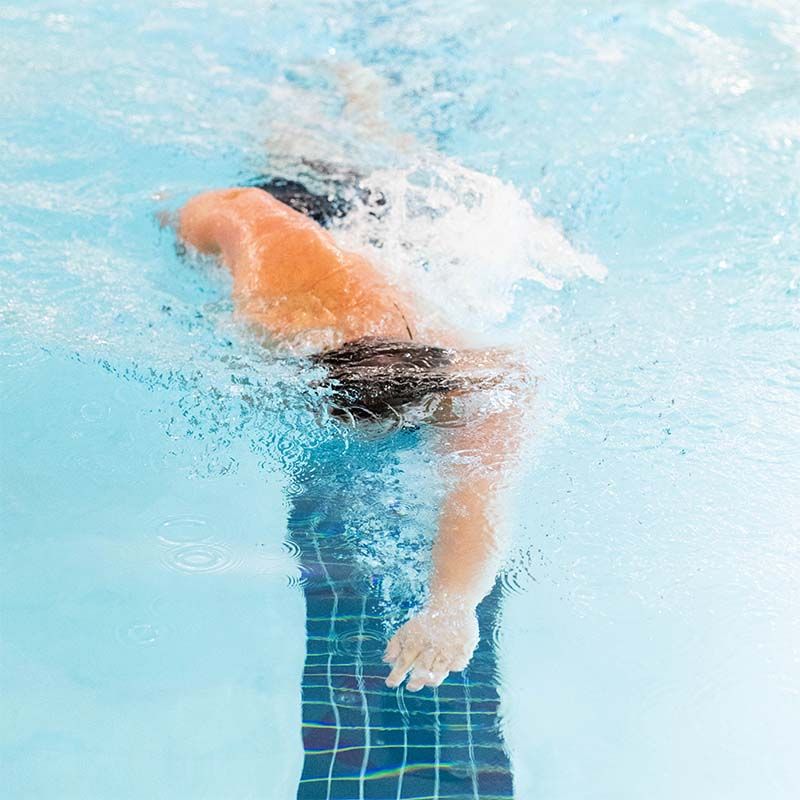Common Aquatic Myths Debunked
October 14, 2021
Written by Luke Leach, LaHaye Aquatics Manager

Many of us love going to the pool to swim for exercise or fun. Little do we know that many of the common “facts” we associate with the pool are myths. In today’s post we are going to dive into some of the most popular myths.
Myth 1: I should wait half an hour after eating before swimming.
I know what you’re thinking, but it’s false. The primary reason for this myth is specifically because of younger children. We do not want children to throw up or poop in the pool. When we encourage kids to wait 30 minutes after eating before entering the pool, the time allows their stomachs to settle and helps decide if they need to go to the bathroom. This also greatly reduces the chance of a pool closure because of an unexpected accident.
We would recommend having a sandwich, protein bar, or other light foods before engaging in a swim workout. Each person reacts differently to the food they eat, but in general swimming before the 30-minute mark is not an issue.
Myth 2: Chlorine will turn my hair green.
Chlorine does not turn your hair green, but there is another chemical in the pool that can — copper sulfate. Copper Sulfate is used in many pools to help combat the growth of algae in the pool. When exposed to this chemical for long periods of time, you can start to see hair turn toward a greenish color. Chlorine still dries out hair, so remember to wash and rinse well after being in the pool or a hot tub.
Myth 3: I should hold my breath when I do my strokes.
It is not recommended to hold your breath for a long period of time while you are swimming. Instead, to be more efficient, you should gently and continuously breathe out of your nose while you are underwater. Blowing bubbles when under the water is beneficial because it empties your lungs, allowing them to prepare for the inhalation when you breathe.
To practice this, we recommend blowing bubbles out of your nose and breathing every three strokes. If you are interested in improving your stroke or breathing techniques, feel free to check out our swim lesson program.
Myth 4: Peeing in the pool is harmless.
Okay let’s admit it, we’ve all done this before. Frankly, peeing in the pool is perceived as harmless but that is also, you guessed it, false. Urine is considered a contaminant, and in large amounts, it can be harmful to the chemical balance of the pool. Fortunately, we can combat urine and other contaminants with chlorine and other treatments at our facility.
At the LaHaye Aquatic Center, we are very fortunate to treat our pool with UV light. UV light is great because it allows us to use less chlorine in the water and makes the water less tough on skin and hair. Both the UV light and chlorine kill any bacteria that may be accidentally secreted into the pool. The used-up chlorine is then filtered out of the pool each hour.
While this is a really cool way that we keep the pool clean, just remember, the pool is not your bathroom.
Myth 5: I don’t need to shower before entering the hot tub or pool.
Most people don’t shower before entering pools or hot tubs. Because a hot tub is a much smaller area of water, all the oils and dirt on your body will mess up the chemical balance causing the hot tubs to close for rebalancing. In addition, pools can quickly become out of balance if enough people get into the water without showering. We kindly ask that people shower to help keep LaHaye Aquatics Center clean, healthy, and open more frequently.
Myth 6: You’re too old to learn how to swim.
A lot of people who never learned how to swim as a child feel like it’s too late to take lessons as adults. Adults can learn just as quickly, if not quicker, than children. If you learn the basics of swimming form and technique and spend time practicing, you will be doing laps in no time. As an adult, you can stay focused for longer periods of time, allowing you to hone in on the practice aspect of swimming. Not to mention that children’s motor skills are not fully developed, which is why they usually take a little longer to learn how to swim.
Campus Recreation offers swim lessons for people of all different levels of expertise. We have a variety of swim instructors with various skillsets to meet the needs of our members! If you are interested in becoming a better swimmer, please check out our Swim Fit program.
